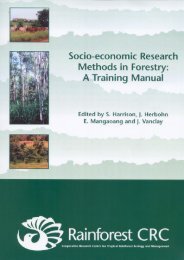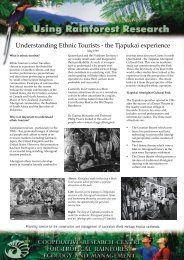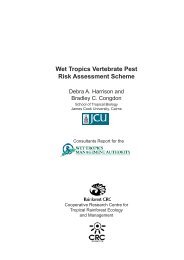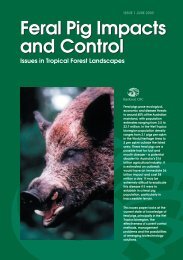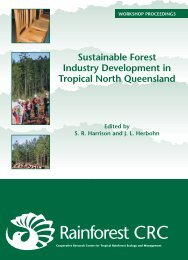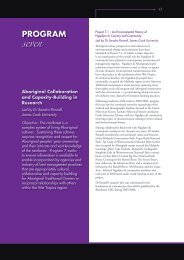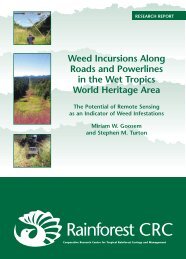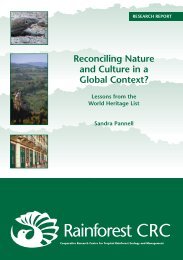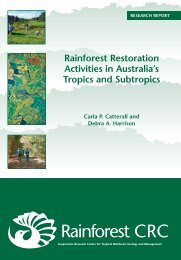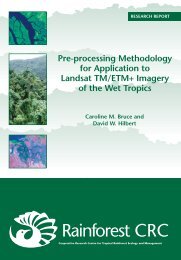Reconciling Nature and Culture in a Global Context? - Rainforest ...
Reconciling Nature and Culture in a Global Context? - Rainforest ...
Reconciling Nature and Culture in a Global Context? - Rainforest ...
Create successful ePaper yourself
Turn your PDF publications into a flip-book with our unique Google optimized e-Paper software.
<strong>Reconcil<strong>in</strong>g</strong> <strong>Nature</strong> <strong>and</strong> <strong>Culture</strong> <strong>in</strong> a <strong>Global</strong> <strong>Context</strong>?Lessons from the World Heritage Listof the virtual environment of Komodo National Park. Certa<strong>in</strong>ly, Komodo National Parkhighlights the disjuncture that exists between the discourse of management (see Pannell1997), with its emphasis upon natural values, biodiversity, habitat conservation, <strong>and</strong>collaborative partnerships, <strong>and</strong> the day-to-day drudgery of clean<strong>in</strong>g toilets, empty<strong>in</strong>g rubbishb<strong>in</strong>s <strong>and</strong> controll<strong>in</strong>g the movement of people to <strong>and</strong> from designated visitor dest<strong>in</strong>ations.While some may argue that bridg<strong>in</strong>g this discont<strong>in</strong>uity between discourse <strong>and</strong> de jourpractices is simply a matter of translation, made possible by more funds <strong>and</strong> resources, thetruth is that the role of national environmental agencies <strong>and</strong> <strong>in</strong>ternational conservationorganisations <strong>in</strong> manag<strong>in</strong>g nature <strong>in</strong> the new millennium <strong>in</strong>creas<strong>in</strong>gly revolves around imagemanagement <strong>and</strong> the manipulation of the eco-tourism experience. Like the creation of anIndigenous culture, <strong>in</strong> order for the nature produced by these forms of political ecology to beperceived as environmental realism, the anthropogenic conditions of its production must beconcealed or back-grounded. As this suggests, the highly mediated ‘naturalisation’ of natureis an overtly political act, which consumes its own agency <strong>and</strong> motivations.Based on the experience of Komodo National Park, serious questions need to be askedabout the identities of the producers <strong>and</strong> consumers of this nature. For example, ‘fromwhom’ <strong>and</strong> ‘for whom’ is TNC ‘sav<strong>in</strong>g the last great places on Earth’ (TNC logo). Given thenumerous references <strong>in</strong> TNC-produced material about the ‘destructive fish<strong>in</strong>g practices’ oflocal people, the answer to the first part of this question is obvious. As Katz po<strong>in</strong>ts out, TNC“works <strong>in</strong> partnership with national environmental organisations to block all ‘human<strong>in</strong>terference’ with the environment it protects” (1998: 59). In Komodo National Park this lastpo<strong>in</strong>t is evident <strong>in</strong> TNC’s arguments that the “carry<strong>in</strong>g capacity of the park for permanentpopulation is currently exceeded” <strong>and</strong> that villagers with<strong>in</strong> the Park should “move to adjacentlarger isl<strong>and</strong>s” to restore balance to the Park’s ecosystems (S<strong>in</strong>gleton et al. 2002: 9). Whilethe evidence strongly supports the claim that the preservation efforts of TNC “<strong>in</strong>sistently evictpeople from nature” (loc. cit.), as the example of Komodo National Park illustrates, onlycerta<strong>in</strong> k<strong>in</strong>ds of people are affected. ‘Eco-tourists’ <strong>and</strong> the ‘nature lovers’ from around theworld who underwrite TNC’s <strong>in</strong>ternational biodiversity <strong>in</strong>vestments are certa<strong>in</strong>ly not amongstthose evicted from nature. While some have referred to the development ofenvironmentalism as a form of ‘green imperialism’ (Grove 1995), the k<strong>in</strong>d ofenvironmentalism practiced by TNC today constitutes a modern-day form of mercantilecolonialism, with the self <strong>in</strong>terests <strong>and</strong> motivations of those <strong>in</strong>volved <strong>in</strong> this privatecorporation concealed by a feel-good mantle of global green altruism. Notwithst<strong>and</strong><strong>in</strong>gcurrent talk of post-colonialism <strong>and</strong> multiculturalism, as Masao Miyoshi argues, “colonialismis even more active now <strong>in</strong> the form of transnational corporatism” (1996: 79).This analogy with the likes of the Dutch East India Company, operat<strong>in</strong>g <strong>in</strong> this region somethree hundred years ago, is even more fitt<strong>in</strong>g when the nature of TNC’s ‘partnership’ with theGovernment of Indonesia is taken <strong>in</strong>to consideration. The grant<strong>in</strong>g of the multi-million dollartourism concession <strong>in</strong> the Park to TNC’s jo<strong>in</strong>t venture company, PT Putri Naga Komodo,enabl<strong>in</strong>g this corporation to “develop the Park as an eco-tourism dest<strong>in</strong>ation <strong>and</strong> to collectentrance fees” (TNC 2002: 5), aptly illustrates how these ‘partnerships’ serve as gatewaysfor the privatisation of nature. In keep<strong>in</strong>g with the analogy of mercantile colonialism (<strong>and</strong> thelogic of modern global capitalism), nature, like the sought after resources of the old worldplundered <strong>in</strong> the past, is regarded as a universal commons 48 . And, as Cordell (1989, 1993)<strong>and</strong> others have identified (see Ganter 1994), those local people erased by the concept of a‘public space exploited by private <strong>in</strong>terests’ bear the full brunt of the ‘tragedy of thecommons’ (Hard<strong>in</strong> 1968).As this talk of privatisation <strong>and</strong> the tragedy of the commons suggests, the issues hererevolve around local ownership, security of tenure, <strong>and</strong> ‘resource sovereignty’ (Howitt et al.48 Similar ideas about the existence of a universal common underwrite the notion of World Heritage.43




